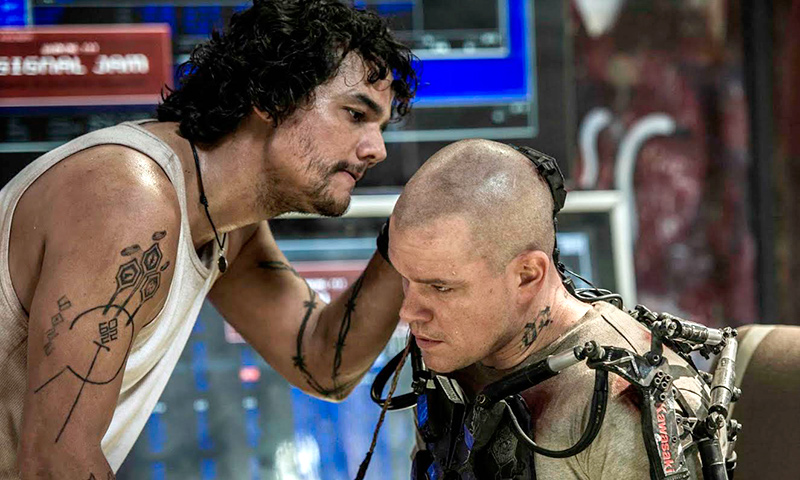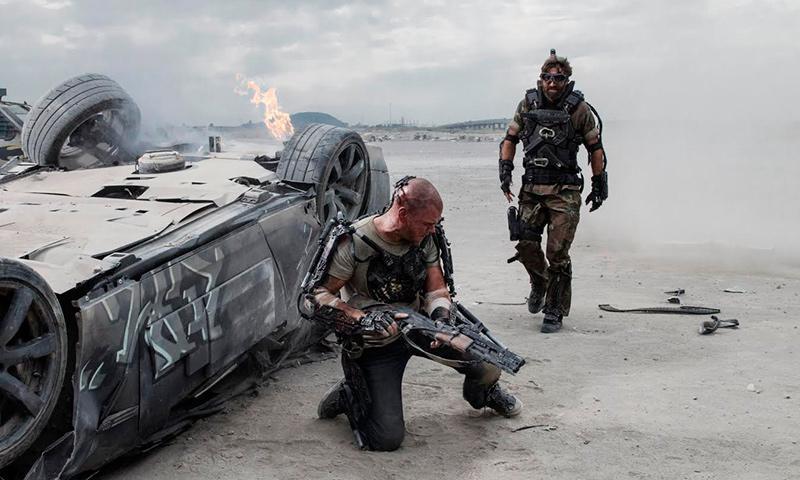
In another of the many likely future dystopias courtesy Hollywood, humanity is trashed by the difference in social classes and dull-witted tyranny.

The difference between the moneyed and the money-stricken is as visually literal as heaven and hell: the destitute live in an overpopulated ecological disaster that’s future-Los Angeles (though it can pass be any other place on Earth), while the rich are settled away in Elysium – a wheel-like space station that looks like Mercedez-Benz’s logo from space, while inside, it is a cross between a rough matte-painting and an overly sterilized Malibu California.

The well-off also have a wondrous medicine-machine called Med-Bays – human scanners that cure everything from cancer to the common cold, in less time than it takes to brew a mug of coffee. Obviously (even as the climax contradicts it), the Med-Bays are out of the common man’s reach, so something needs to be done about the situation.
Be in no doubt: “Elysium” is pretty ham-handed with its social commentary about humanity’s lack of humanism, clash of classes and society, and a “presumed” blockbuster’s tendency to have insipid action sequences (a classic dystopian cyberpunk element gets lost somewhere in between). Not everything gels within the story’s structure.
Most of “Elysium” centers on Max Da Costa (Matt Damon) an ex-con on parole who works at a military arms supply company called Armadyne Corp. In a string of episodes, Max gets radiation poisoning (he has five days to live), is infused with a clunky (and cheap looking) strength-boosting mechanized exoskeleton, has corporate secrets lodged in his brain, and tries to smuggle away to Elysium for a Med-Bay session.

It’s not as easy as it sounds. Rogue flights are shot down by Jessica Delacourt (Ms. Foster), Elysium’s Secretary of Defense who secretly wants to overthrow President Patel (Farhan Tahir).
“Elysium” is a could-have-been film: It could have been absorbing, grander and original in its execution. Instead it just moseys around, wasting important screen-time on valueless plot-points and villainy copy-pasted out of a B-science fiction movie. Mr. Blomkamp’s screenplay – or the film’s run-of-the-mill, low-budget-looking, production design by Philip Ivey – mangles whatever creative potential “Elysium” has into a hodgepodge of seen-it-all-before story resolves. There is nothing inspirational about Max’s against-the-clock run to save himself, or the plight of the film’s side characters (Diego Luna plays Julio his friend; Alice Braga is Frey Santiago, a long, lost love interest whose daughter suffers from leukemia).
Even the bad guys are badly setup. Ms. Foster plays Delacourt like a drab emotionless villainess, chowing down her scenes without self-conviction. Her hit-man for hire Kruger, played by Sharlto Copley, simply lacks credibility. When Kruger becomes a gung-ho out-of-his-mind psycho terrorist aboard “Elysium” near the climax, one begins to wonders: “just what was Mr. Blomkamp thinking?”

Mr. Damon, who often plays intelligent action heroes, then has to shoulder most of “Elysium’s” drive and acceptability (or whatever of it the film has left after its first twenty minutes). His Max is a transparent character, who like a decent number of roles in Mr. Damon’s resume, has the inherent tendency to side-step and merge within the narratives’ overall ambiance – which becomes overly slapdash with every minute of its running time.
At times one genuinely feels for Mr. Damon. He is running a one-man marathon, where even the sole-runner places second.
Released by Tristar Pictures, “Elysium” is rated PG-13 featuring the usual apocalyptic (or is it post-apocalyptic?) violence and death.
Directed and Written by Neill Blomkamp; Produced by Bill Block, Mr. Blomkamp and Simon Kinberg; Cinematography by Trent Opaloch; Edited by Julian Clarke and Lee Smith; Production design by Philip Ivey and Music by Ryan Amon.
The film stars: Matt Damon, Jodie Foster, Sharlto Copley, Alice Braga, Diego Luna, Wagner Moura and William Fichtner.












































